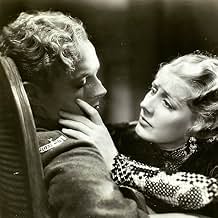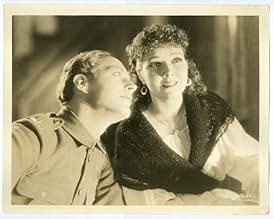Ajouter une intrigue dans votre langueShowgirl Sally meets young playboy Leonard St. John; they fall in love and are secretly married. When Leonard's father discovers this he sets out to break them apart, and following a bitter ... Tout lireShowgirl Sally meets young playboy Leonard St. John; they fall in love and are secretly married. When Leonard's father discovers this he sets out to break them apart, and following a bitter row, Leonard kills himself, leaving Sally to pick up the pieces of her life.Showgirl Sally meets young playboy Leonard St. John; they fall in love and are secretly married. When Leonard's father discovers this he sets out to break them apart, and following a bitter row, Leonard kills himself, leaving Sally to pick up the pieces of her life.
- Réalisation
- Scénario
- Casting principal
- Undetermined Secondary Role
- (scènes coupées)
- British Soldier
- (non crédité)
- Aubrey's Butler
- (non crédité)
- Supper Club Guest
- (non crédité)
- French Hotel Desk Clerk
- (non crédité)
- Aubrey's Secretary
- (non crédité)
- Marie - the French Nurse
- (non crédité)
- Cafe Proprietress
- (non crédité)
- Commanding Officer
- (non crédité)
- Aubrey's Maid
- (non crédité)
Avis à la une
An entire genre of motion pictures, which often feature Barbara Stanwyck or Lana Turner, has used this basic plot to wring tears from largely female audiences. In "The Secret of Madame Blanche," Irene Dunne takes a turn at this well-worn routine and maintains her dignity throughout, despite the script's attempts to drown her in clichés. In the role of showgirl, Sally Sanders, Dunne has a few opportunities to show off her fine voice, but the musical selections are poor. The relatively short film, which was adapted from a play, lurches forward from hackneyed scene to hackneyed scene and leaves chasms of time for the audience to fill in. Occasionally, patient viewers will be rewarded with dialog and delivery so rich in camp that they will howl helplessly with unintended laughter, although a mouth-to-mouth kiss between mother and son, perhaps common for the period, induces cringes today. While Lionel Atwill is effective as Aubrey St. John, the selfish controlling father, and Philips Holmes is appropriately weak as his son, the rich playboy, the film offers little beyond the incomparable Irene Dunne slumming in a sub-par vehicle. Coincidences abound, French accents come and go, laws benefit the rich and oppress the poor, and a mother's self-sacrificing love conquers all. What more could one ask for? Perhaps Barbara Stanwyck and "Stella Dallas?"
Now I must admit that usually a film with this many weepy scenes turns me off a bit, but the writers, directors and Irene Dunne manage to weave a tale so well that my sometime cynical nature was kept in abeyance. Plus, the amazingly awful and evil character played by Lionel Atwill was one of his best roles--one that will definitely make an impression on the viewer. Now I must admit that the impossibility of the final third of the film was at first a bit hard to take, but when the plot wrapped up like it did, I found I just didn't care--I wanted the hokey Hollywood ending and enjoyed it thoroughly. An excellent weepy film--similar to, but in many ways superior to MADAME X and SO BIG! If you liked this film, try Barbara Stanwyck's STELLA DALLAS--another great weepy melodrama.
Dunne plays a singer and does get to show her vocal talents in this film which is always appreciated. Holmes who does nothing, but spend dear old dad's money in various hedonistic pursuits. Of course dad does not even try to channel Holmes into some useful profession where he could have an income. What he wants and frankly I thought this a hoot, he wants to have him get a seat in Parliament with of course an arranged marriage with a woman of the proper station.
Atwill has really no redeeming qualities as a father. He just wants to dominate his kid. Eventually he forces Dunne to give her child over to him to be raised in the image. As the kid grows up to be Douglas Walton he truly is a chip off the old Atwill/Holmes block.
Fast forward to the World War I years and Walton while AWOL gets himself in a big jackpot and he also meets Dunne with no idea she's his mom. Atwill told him she was dead.
I won't go any farther except to say that the whole thing has a Madame X quality to it. It does work out better for the principal cast members.
The Secret Of Madame Blanche is a property very unlikely to be remade. Still the cast led by Dunne, Holmes, Atwill, and Walton does pull it together.
Anyway, Holmes quickly justifies are suspicions. His father disinherits him, so angry is he that Holmes has married so far below his station. Holmes does nothing to make us feel any sympathy for him, but Irene Dunne loves him so! A real unappealingly weak character, he is.
The dialogue is so insipid and without drama in the first half of the film that I seriously wondered whether I had the will to see it through.
Happily, there is much improvement in the second half. Dunne's soldier-son, played by Douglas Walton, starts off as weak and selfish a person as his father (Holmes) was, but he does grow up and change nicely, and is somewhat appealing. Dunne is fabulous and convincing as an older woman - actually, impressively so - it is hard to recognize her as an attractive younger woman in her "old age" make-up!
Lionel Atwill is absolutely evil as Holmes' brutally heartless father. The best scene in the film actually occurs in the first half: look for the close-up, upper-bodies -only shot of Dunne and Holmes in what will be their final parting; the entire shot is beautifully and slightly and softly out of focus, and is quite effective and touching.
Overall, this is a mixed bag, but if you love early sound films just for their own sake, or are a fan of Irene Dunne, then you will appreciate this little soap opera.
Le saviez-vous
- AnecdotesThe play originally opened in New York City, New York, USA on 4 December 1923 and ran for 85 performances.
- ConnexionsEdited from La grande parade (1925)
- Bandes originalesIf Love Were All
(1924) (uncredited)
Music by William Axt
Lyrics by Martha Lois Wells
Sung by Irene Dunne in a show
Meilleurs choix
Détails
- Date de sortie
- Pays d’origine
- Langue
- Aussi connu sous le nom de
- The Secret of Madame Blanche
- Lieux de tournage
- Société de production
- Voir plus de crédits d'entreprise sur IMDbPro
- Durée
- 1h 24min(84 min)
- Couleur
- Rapport de forme
- 1.37 : 1








































